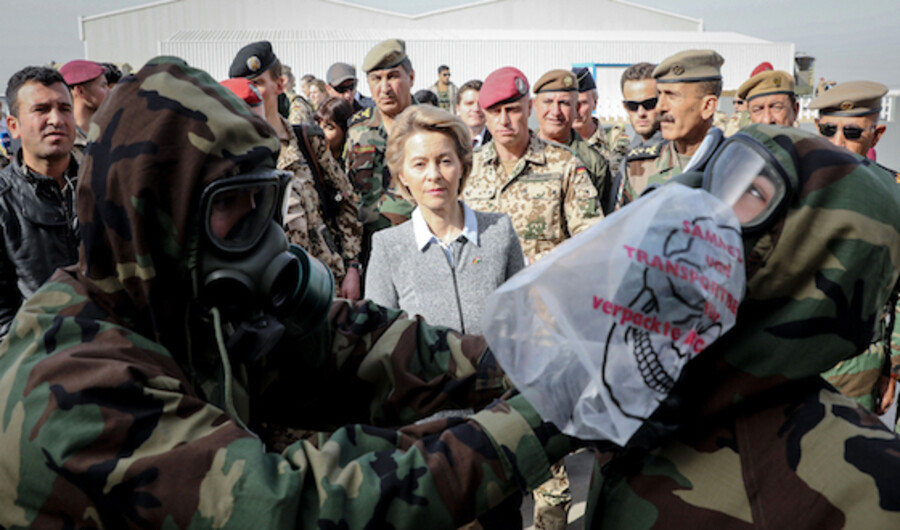
KAY NIETFELD/PICTURE ALLIANCE VIA GETTY IMAGES
What Is Germany Doing in Iraq?
Der Spiegel reported that German forces began training the Iraqi army at Camp Taji near Baghdad on August 11. German troops previously trained Kurdish Peshmerga fighters in northern Iraq, but now they are directly training Iraq’s military, hoping to transform the currently ineffectual Iraqis into a more potent force. Germany claims its objective in the training is to bring stability to the country.
Germany’s New Iraq Mission
At the height of the savagery of the Islamic State in 2014, the Vatican called specifically for military intervention in Iraq. Germany acted on this call. In February 2015, Germany launched its own mission in Iraq without the backing of either the United Nations or nato . The unprecedented, arguably unconstitutional mission was justified by the goal to stop the “barbarism” of the Islamic State.
Since 2015, Germany has deployed almost 1,600 soldiers to Iraq. German officers have trained approximately 18,000 Kurdish Peshmerga fighters.
At the time the Peshmerga were regarded as arguably the most capable ground force fighting the scourge of Islamic State terrorists in Iraq.
In addition to its training mission, Germany also supplied weapons, vehicles, equipment and clothing. The German government estimates the costs of the Bundeswehr participation to be around $114 million.
The mission’s proclaimed goal was to defeat the Islamic State. This has largely been accomplished by all accounts, including the German government’s own statements in its recent report on its Iraq mission. So why is Germany continuing—and expanding—its training mission?
Iraq’s government has long criticized Germany’s mission in Iraq. Germany has trained thousands of Kurdish fighters and heavily equipped them, but it has declined to support Iraq’s army. “The Kurds got rockets and modern rifles; we have a right for the same,” a consultant to Iraqi Prime Minister Haider al-Abadi told Spiegel at the last nato summit in July.
Germany has now decided to step up its contributions to the Iraqi army, but its support is selective. Spiegel Online reported on August 1 (Trumpettranslation throughout):
The Bundeswehr expressly does not want to train soldiers of the countless Shiite militias, of which some are directly controlled by Iran. However, it is precisely these militias that Baghdad wants to integrate slowly into the Iraqi army, so separating the later training participants by the Bundeswehr will be difficult.
The Iranian-backed Popular Mobilization Forces consists of nearly 15,000 fighters in about 40 groups. The recent battles with the Islamic State have further weakened Iraq’s national army, increasing its vulnerability to the influence of and pressure from foreign militias.
One of the biggest problems Iraq’s army is facing is a lack of coordination and logistics. By providing Iraq’s military with the necessary leadership, counsel and guidance, Germany hopes to strengthen Iraq’s army as a force that is independent from Iran’s influence.
In August, more information about Germany’s vaguely described mission was released. Spiegel Online reported on August 29 (Trumpet translation throughout):
On August 11, a small team of instructors started a pilot training course for soldiers of the Iraqi army at Camp Taji near Baghdad. In the former army camp of Saddam Hussein, German soldiers will train the Iraqis in nbc defense, logistics, troop management, mine clearance and sanitation.
The new specifics are the result of a detailed report that will be approved by the cabinet today. The government had previously announced the new mission, but so far hasn’t set a date for it. Since 2014, the Bundeswehr has trained the so-called Peshmerga fighters in the Kurdish-controlled north of the country and supplied them with weapons.
Focus of the operation will now be on Taiji and Besmaja temporarily. Both locations are currently being used and secured by Iraqis and foreign soldiers.
The Bundeswehr is currently deploying 415 soldiers for the Iraqi-Syrian mission. The approved mandate allows up to 800 soldiers for the mission, which will be organized bilaterally with the Iraqi government. The German soldiers are flying in from Jordan and running training projects for periods of six to eight weeks each.
A February visit from German Defense Minister Ursula von der Leyen to Iraq gives further insight into the objective of Germany’s mission. During her trip, she stated that Germany hopes to build a bridge between Irbil and Baghdad. Irbil, located in northern Iraq, is the capital of the Kurdish region of Iraq. Baghdad is Iraq’s official capital.
While Iraq’s north is clearly opposed to dominance by the Iranians, the regions around Baghdad continually flirt with and accept Iran’s support. The fact that Germany refuses to support Iranian troops in the region, trains anti-Iranian Kurdish forces in the north, and now seeks to connect them with Iraq’s central government, clearly shows that Germany intends to weaken Iran’s power in Iraq.
Iran has been working for years to get a stronghold in Iraq and has sought a close alliance with its government. The people in Iraq themselves are divided. Some groups vehemently oppose Iran’s involvement in the region and demand more independence from Iran. Germany hopes to strengthen that resistance.
Refusing to Cooperate With NATO
Germany has launched its missions in Iraq despite the fact that nato has its own mission there—which is, in theory, doing exactly the same thing.
In July, Der Spiegel learned that the German government had absolutely refused to take part in a nato-led mission aimed at strengthening Iraq’s army. On July 6, it reported (Trumpet translation throughout):
Training yes, but not with nato.
[nato’s] training deployment [in Iraq] is considered one of the most important decisions of the summit. The alliance wants to prove its ability to act and also show that it is committed to fighting against terrorism. …
Thus nato Secretary General Jens Stoltenberg is surprised about Germany’s decision, according to Spiegel information. At a confidential meeting with German defense politicians, he said that nobody in the alliance understands why Germany wanted to get involved in Iraq, but not in cooperation with the alliance.
Stoltenberg has good reason to wonder about Germany’s decision. natoand Germany both claim to be fighting against another uprising of the Islamic State. Both claim that their mission is designed to bring security to the Middle East and stability to Iraq. Both missions are aimed at training Iraq’s army. Germany even benefits from nato’s security umbrella in the region, yet it won’t support the nato mission, even though it is a natomember.
“nato would have loved to integrate Germany in its training mission, but this failed largely due to the resistance of the Social Democrats (spd),” Spiegel Online reported on August 1. Gerhard Schröder, former leader of the spd, vehemently opposed U.S. intervention in Iraq in 2003. The defeat of Saddam Hussein, which came as a result of the intervention, allowed Iran to gain the upper hand in the region.
Germany clearly has its own goals in the region.
The strategic interests of Germany and Iran are clashing in the Middle East. Trumpet editor in chief Gerald Flurry explains how the Bible reveals those goals in his free booklet Germany’s Secret Strategy to Destroy Iran.Daniel 11 describes a clash that takes place “at the time of the end” between a “king of the north” and the “king of the south.” As he explains in his free booklet The King of the South, a German-led Catholic Europe is the king of the north and radical Islam led by Iran is the king of the south. Mr Flurry writes:
Daniel 11:40 describes how the king of the south will be violently invaded by the “king of the north”: “At the time of the end”—that is the time immediately before us—“shall the king of the south push at him: and the king of the north shall come against him like a whirlwind, with chariots, and with horsemen, and with many ships; and he shall enter into the countries, and shall overflow and pass over.” …
This prophecy describes Germany and the new Holy Roman Empire. The Germans are excellent war strategists and warriors. They are savvy enough to realize that they will never have peace with Iran. They know that sooner or later, their two religions—their two civilizations—will clash.
This scripture describes a time when Germany’s Catholic empire will wage all-out war, throwing everything it has at radical Islam—and dominating it like a violent flood pouring in!
That’s why Germany refused to take part in the nato mission in Iraq—it is pursuing its own goals in the region.
But neither Germany’s nor the Vatican’s ambitions end with opposing Iran. There is an even deeper, more sinister reason why Germany wants to gain dominance over the Middle East. Historically, the Holy Roman Empire, led by the Vatican, always sought to dominate Jerusalem. The Bible clearly states that Germany’s ambitions in this end time will be no different. Daniel 11:44 reads, “And he shall plant the tabernacles of his palace between the seas in the glorious holy mountain.” Once Germany destroys Iran in an unexpected whirlwind attack, its strategic position in Iraq will further its goal to get control over the Holy Land.
Today we are witnessing the prophesied clash between Iran and Germany. To understand the full context of these prophecies, request a free copy of Germany’s Secret Strategy to Destroy Iran. ▪
